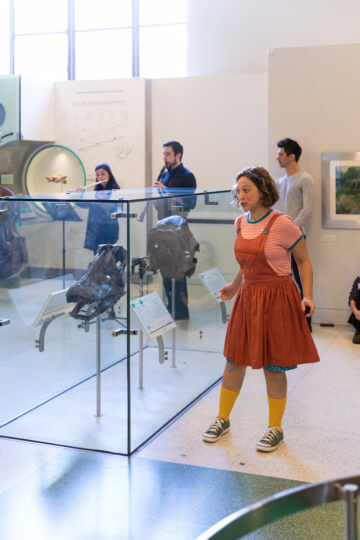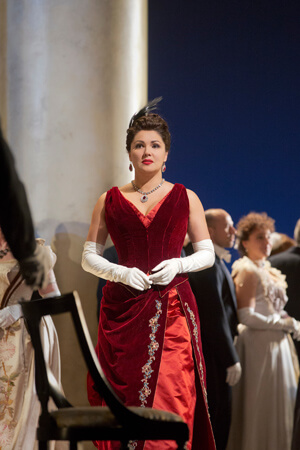Hanna-Elizabeth Müller and Adrianne Pieczonka in Beethoven’s “Fidelio.” | KEN HOWARD/ METROPOLITAN OPERA
BY DAVID SHENGOLD | On March 16, the Met revived “Fidelio” in Juergen Flimm’s visually unappetizing, dramatically fussy, and often just wrong-headed production, full of upstaging and misdirected focus (like the final scene’s ludicrous Marzelline meltdown and crowd lynching of Pizarro). I nevertheless enjoyed myself.
Sebastian Weigle led unevenly, but enough of the resplendent score hit home to compel admiration and some tears. The musical totality outweighed the negatives.
Out Canadian soprano Adrianne Pieczonka seemed utterly natural as the cross-dressed Fidelio/ Leonore, maybe a touch placid. Where Karita Mattila gave a luminous-voiced but transparently feminine and somewhat self-regarding Star Turn and Waltraud Meier swept all vocal problems away with her keen dramatic focus, Pieczonka, though solid and likeable, proved more earthbound. Occasionally strident, she offered accomplished, honest, but unstarry singing.
A “Fidelio” revival, final “Werther,” red dress “La traviata”
Klaus Florian Vogt — whose “choirboy” Lohengrin has amazed me in Dresden and here — proved disappointing in this. His Florestan emerged consistently ill-tuned and short-breathed, with the clearish timbre too often curdling as it projected. Company debutante Hanna-Elisabeth Müller offered an acceptable but unremarkable Marzelline, with somewhat splayed top notes; she may be covering the “Rosenkavalier” Sophie but she hardly sounded worth the importing.
Jaquino — a slippery careerist in this production — was unusually well voiced by David Portillo. Greer Grimsley’s voice in a smaller theater sounds enormous; not so at the Met. But its inky impact suited Pizarro well. Falk Struckmann, a real actor, is hardly the roundest-voice Rocco imaginable but every moment of his complex characterization merited watching. Guenther Groissboeck’s rather extrovert technique makes wonder about his long-term prospects; for now, he sounded duly noble as Fernando. Amazingly James Morris, whose first Met Fernando came in 1972, sings the last two shows here April 5 and 8.
I found the usually sublime Prisoner’s Chorus as underanimated by Weigle as by Flimm – though the voices sounded pleasant. Kang Wang used the First Prisoner’s lovely music to audition for Calaf, but Paul Corona sounded nobly mellow as the Second Prisoner.
The season’s moving last performance of Massenet’s “Werther” (March 9) featured the title role’s “cover” — the performer who understudies another, supposedly more audience-worthy singer. The French tenor Jean-Francois Borras had covered Jonas Kaufmann when Richard Eyre’s rather overstuffed staging was new three years ago and took on one performance. Since then he’s appeared several times in “La Boheme” and once as the Duke in “Rigoletto.” But Borras’ is a voice best heard in his native repertory. Even though the year’s main Werther, Vittorio Grigolo, has pretty good sung French by the standards of most Italian tenors, it proved a huge pleasure just to hear Borras string the Gallic words on his phrases with utter naturalness. Unlike the always-on-all-eight-cylinders Grigolo, Borras also channels the airy, “voix mixte” style associated with classic francophone tenors. He paced himself well, with only the ringing high B natural of Werther’s Act II apostrophe to God getting slightly out of hand. More Borras singing Massenet awaits us in next season’s “Thais.”
David Bizic in Massenet's “Werther.” | MARTY SOHL/ METROPOLITAN OPERA
The only colleague to approach Borras’ level of expressiveness in French was the substantive Paris-trained Serbian baritone David Bizic. As Charlotte, for whom the men compete, Isabel Leonard looked pretty, as ever, and 100-percent contemporary, as ever. Her singing was basically acceptable but hardly the stuff of which real – not “manufactured” – star reputations are forged. Anna Christy’s Sophie had more “face” and dramatic punch, but sounded too soubrettish. Edward Gardner’s warm orchestral reading was the best thing he’s done at the Met.
Willy Decker’s soon-to-vanish “red dress” staging of “La traviata” rediscovered one of its best protagonists in Sonia Yoncheva. The Bulgarian diva, one of the singers on the Met fast track who most belongs there did not sing a perfectly intoned or uttered performance March 7, but what she had to offer in passion, warm sound, and overall rightness for so many roles’ manifold challenges more than compensated for the flaws: a real Violetta – and they are few. She generated effective chemistry with Michael Fabiano’s Alfredo.
Very boyish onstage when properly bewigged, Fabiano made the interesting choice to make the usually ardent, fairly shallow character be more complex — just as complicit in Violetta’s destruction as everyone else. He certainly sang ardently, and with welcome dynamic variety — save for blasting out many notes A and above; no Alfredo ever sounds great yelling out an unwritten C as “O mio rimorso” ends, and Fabiano’s was pressured and unlovely.
Vocally, not a single sound Thomas Hampson uttered as Germont evoked the great performances in Mozart, Rossini, Berlioz, and Busoni roles that established and sustained the baritone’s deserved Met and worldwide fame. There are parts in which the very intelligent Hampson could sustain his reputation with honor; the Sprecher, Rangoni, Dr. Schoen. Germont, the “Hoffmann” villains, and Don Giovanni — all on his future calendar — are not among those parts.
Nicola Luisotti tended to drown his singers out insensitively.
David Shengold (shengold@yahoo.com) writes about opera for many venues.

































